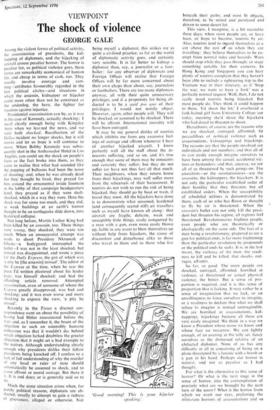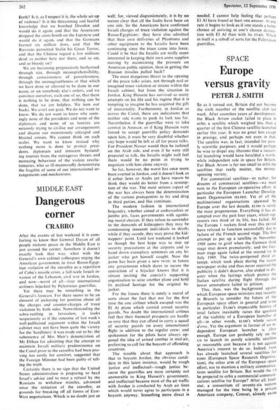VIEWPOINT
The shock of violence
GEORGE GALE
Among the violent forms of political activity, the assassination of presidents, the kid- napping of diplomats, and the hijacking of aircraft arouse peculiar horror. The horror is peculiar for, as political violence goes, these forms are remarkably economical of human life, and cheap in terms of cash, too. They
usually involve courage and cun- ning—attributes favourably regarded in the best political circles—and situations in which the assassin, kidnapper or hijacker could more often than not be construed as the underdog, the hero, the fighter for freedom against injustice.
Presidential assassination can be, as it was in the case of Kennedy, actually shocking: I recall clearly enough being with Kingsley
Amis when we learned the news, and we were both shocked. Recollection of the
Dallas incident no longer shocks, but it still moves and let us hope it will continue to move. When Bobby Kennedy was subse- quently shot in the Ambassador Hotel in Los Angeles, you could see the shock on people's faces as the fact broke into them, as they came to realise that what had sounded like the popping of balloons had been the noise of shooting; and, when he was already dead but they thought he lived, they prayed for him around the ornamental inside fountain in the lobby of that campaign headquarters hotel, they prayed as if they were shell- shocked, which in a way they were. Here the shock was for some too much, and they slid,
as weak buildings at an earth's tremor thought to be an earthquake slide down, into hysterical collapse.
Not long before, Martin Luther King had been killed by an assassin, too. These things were wrong, they shocked, they were too
much. When an unsuccessful attempt was made to shoot President Nkrumah of Ghana—a bodyguard intercepted the
bullet—I was not in the least shocked, but instead was disappointed, and wrote a piece for the Daily Express, the gist of which was 'a pity he [the assassin] missed'. The editor of the Ex press at the time, when he saw the
piece I'd written plastered about his leader page, was himself shocked; and had the offending article removed. Attempted
assassination, even of someone of whom the Express greatly disapproved, was bad and shocking; and it was even worse and more shocking to express the view, 'a pity he missed'.
Recently in the Times a discreet cor- respondence went on about the possibility of having had Hitler assassinated before the war; and, as I remember it, the brunt of the objection to such an ostensibly humane endeavour was that it wouldn't do; behind which objection lurked doubtless the greater objection that it might set a bad example to the natives. Although understanding clearly enough why presidents dislike their fellow presidents being knocked off, I confess to a lack of full understanding of why the murder of any head or ruler of state should automatically be assumed to shock, and to cause affront or moral outrage. But there it
is. It is and does; or is generally said so to do.
Much the same situation arises when, for purely political reasons, diplomats are ab- ducted, usually to attempt to gain a redress of grievances, alleged or otherwise. Not
being myself a diplomat, this strikes me as quite a civilised practice, as far as the world of diplomatic activity goes, and certainly very sensible. It is far better to kidnap a diplomat than, say, a journalist or a foot- baller: for any observer of diplomats and Foreign Offices will realise that Foreign Offices will be far more concerned about their own chaps than about, say, journalists or footballers. There are too many diplomats anyway, all with their quite unnecessary privileges, and if a propensity for being ab- ducted is to be a quid pro quo of their privileges, I would not noisily object. However, again, other people will. They will be shocked, or assumed to be shocked. There will be affront. International morality will have been outraged.
It may be my general dislike of tourists which inhibits me from any excessive feel- ings of outrage and affront whenever I hear of another hijacked aircraft. I know perfectly well all the stuff about the in- nocents suffering, and so on, and it's true enough that some of them may be innocents and certainly they suffer; but they do not suffer (or have not thus far) all that much. Their neighbours, when they return home from their hijackings, may well suffer more from the rehearsals of their harassment. If tourists do not wish to run the risk of being hijacked, they should go by boat or train, if travel they must. All the hijackers have done is to demonstrate what seasoned, hardened (and consequently scared stiff) air travellers such as myself have known all along: that aircraft are fragile, delicate, weak and susceptible little things, easily conquered by a man with a gun, even more easily blown up, liable in any event to blow themselves up without help from hijackers, the cause of discomfort and disturbance alike to those who travel in them and to those who live beneath their paths, and most fit objects, therefore, to be seized and paralysed and driven to some desert lot.
This view, I recognise, is a bit recondite these days, when most people are, or have been, or hope to become, tourists by air.
Also, tourists tend to regard themselves as a cut above the rest of us when they are travelling: they believe themselves to be ex- empt from normal rules and hazards. Wars should stop while they pass through: or stage something suitable for their cameras. In Hong Kong and Singapore you can hear plenty of tourists complain that they haven't been able to include a sightseeing trip to the Vietnam war in their itinerary, as if 'Stop the war, we want to have a look' was a perfectly normal request. Well, then, I do not really mind tourists being hijacked. But most people do. They think it could happen to them. 'I'd shoot the lot.' I overheard a lank-haired girl from University College say today, meaning she'd shoot the hijackers who had dared to threaten to shoot.
Hereabouts, of course, are the reasons why we are shocked, outraged, affronted, by peccadilloes of political violence such as assassinations, kidnappings and hijackings. The reasons arc that the people involved are individuals and not numbers: and that all of us can easily enough imagine ourselves to have been among the casual, accidental vic- tims or bystanders: and that, anyway, we are all of us threatened by such goings-on. The anarchists—or the revolutionaries—are the
assassins, the kidnappers, the hijackers. It is not only the particular established order of their hostility that they threaten, but all established orders. When the susceptibility of scheduled airlines is demonstrated by them, each of us who has flown or thought to fly by air is threatened. When the assassin's bullet can not only kill the presi- dent but threaten his regime, all regimes feel threatened. Revolutionaries frighten people, even people who are theoretically or ideologically on the same side. The fact of a man being a revolutionary, prepared to use a gun for political ends, is far more frightening than the particular revolution he propounds or the political ends he seeks. It is. in the last resort, the violence of the man, the readi- ness to kill and be killed, that shocks, out- rages, affronts.
So far, so good. The more people are shocked, outraged, affronted. horrified at violence, at threatened or actual physical violence, the better. But a sense of pro- portion is required. and it is this sense of proportion that is lacking. It may rather be a sense of imagination that we lack, or an unwillingness to force ourselves to imagine, or a readiness to declare that what we shall refuse to imagine is instead unimaginable. We are horrified at assassinations, kid- nappings. hijackings because all these are very easily imagined. We think in a way we know a President whose name we know and whose face we recognise. We can lightly enough, of an evening at the telly set, fancy ourselves as the distressed relative of an abducted diplomat. None of us has any difficulty at all in conceiving of being on a plane threatened by a lunatic with a bomb or a gun in his hand. Perhaps our horror is natural, and not as peculiar as I had thought.
For what is the alternative to this sense of horror? Or what is the next stage in the sense of horror, into the contemplation of precisely what are we brought by the next turn of the screw? What is the horror from which we avert our eyes, preferring the miniature horrors of assassinations and so
forth? Is it, as I suspect it is, the whole set-up of violence? Is it the threatening and fearful knowledge that we bombed Dresden and would do it again, and that the Americans dropped the atom bomb on the Japanese and would do it again, and that the Germans burned six million Jews, and that the Russians permitted Stalin his Great Terror, and that the Chinese regard a few millions dead as neither here nor there, and so on, and so bloody on?
We are becoming progressively barbarised through size, through incomprehensibility, through consciousness of powerlessness, through the unimaginableness of that which we have done or allowed to be done in our name, or on somebody else's orders, and we convince ourselves, each one of us, that there is nothing to be done, that nothing can be done, that we are helpless. We turn our backs. We avert our gaze. We do not want to know. We do not want to know why seem- ingly none of the presidents and none of the diplomats and none of us tourists are seriously trying to civilise our arrangements and disarm our monstrously enlarged and bloated armies. We cannot think on such scales. We want to know instead why nothing more is done to protect presi- dents, diplomats and innocent bystand- ing tourists from the outrageous threats and menacing behaviour of the violent revolu- tionaries, who so ill-manneredly demonstrate the fragility of some of our international ar- rangements and mechanisms.















































 Previous page
Previous page